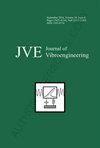Experimental analysis on the structural seismic behavior of steel frame-precast steel reinforced concrete (SRC) infill wall with lateral force resisting
IF 0.9
Q4 ENGINEERING, MECHANICAL
引用次数: 0
Abstract
The structural seismic performance of steel frame-precast steel reinforced concrete (SRC) infill wall with lateral force resisting is analyzed, and the structural strength of steel frame-precast SRC infill wall with lateral force resisting is improved. The structural seismic performance optimization model of SRC lateral force resisting wall based on buckling restrained brace is proposed. Through the finite element simulation software, the seismic performance and response results of ordinary steel frames, buckling restrained braced steel frames and a relatively new type of sacrificial-energy dissipation braced steel frames under earthquake are compared and analyzed to demonstrate the applicability and performance advantages of sacrificial-energy dissipation braced steel frames in the steel frame braced structure system. Under the action of horizontal earthquake, the supporting members experience reciprocating axial tension and compression cycles, which dissipate a large amount of seismic energy input into the structure. Therefore, the buckling restraint support method can be used in the structure to improve the support strength. Under horizontal reciprocating load action of earthquake, the ability to consume seismic energy through self-hysteresis of the brace is poor. Experimental research shows that, the unbalanced force formed in the beam of the frame beam under seismic action will form a plastic hinge at the beam end at both ends of the frame beam. Especially when the brace is buckling unstable and the stiffness of the frame beam is small, the plastic hinge effect at the beam end is significant. This phenomenon may cause damage to the frame beam or even local floor subsidence. The buckling restraint support has a full hysteresis area under axial tension and compression, and its mechanical performance is excellent. It is obviously superior to ordinary steel bracing in energy dissipation capacity and seismic performance. It can accurately predict the bearing capacity of reinforced concrete under strong earthquake, and the energy dissipation distribution is more in line with the requirements of “energy seismic design method”.钢框架-预制钢筋混凝土(SRC)填充墙结构抗侧力抗震性能试验分析
分析了钢框架-预制型钢骨混凝土(SRC)填充墙的结构抗震性能,提高了钢框架预制型钢混凝土填充墙的抗侧力结构强度。提出了基于屈曲约束支撑的SRC抗侧力墙结构抗震性能优化模型。通过有限元仿真软件对普通钢框架的抗震性能和响应结果进行了分析,对屈曲约束支撑钢框架和一种比较新型的牺牲耗能支撑钢框架在地震作用下进行了比较分析,论证了牺牲耗能支撑框架在钢框架支撑结构体系中的适用性和性能优势。在水平地震作用下,支撑构件经历往复的轴向拉压循环,耗散了输入结构的大量地震能量。因此,可以在结构中采用屈曲约束支撑方法来提高支撑强度。在地震的水平往复荷载作用下,支架通过自滞后消耗地震能量的能力较差。试验研究表明,在地震作用下,框架梁的梁中形成的不平衡力会在框架梁两端的梁端形成塑性铰。特别是当支撑屈曲不稳定且框架梁刚度较小时,梁端塑性铰效应显著。这种现象可能会导致框架梁损坏,甚至局部地面沉降。屈曲约束支座在轴向拉压作用下具有全滞后区,力学性能优异。其耗能能力和抗震性能明显优于普通钢支撑。它可以准确地预测钢筋混凝土在强烈地震下的承载力,耗能分布更符合“能量抗震设计方法”的要求。
本文章由计算机程序翻译,如有差异,请以英文原文为准。
求助全文
约1分钟内获得全文
求助全文
来源期刊

Journal of Vibroengineering
工程技术-工程:机械
CiteScore
1.70
自引率
0.00%
发文量
97
审稿时长
4.5 months
期刊介绍:
Journal of VIBROENGINEERING (JVE) ISSN 1392-8716 is a prestigious peer reviewed International Journal specializing in theoretical and practical aspects of Vibration Engineering. It is indexed in ESCI and other major databases. Published every 1.5 months (8 times yearly), the journal attracts attention from the International Engineering Community.
 求助内容:
求助内容: 应助结果提醒方式:
应助结果提醒方式:


